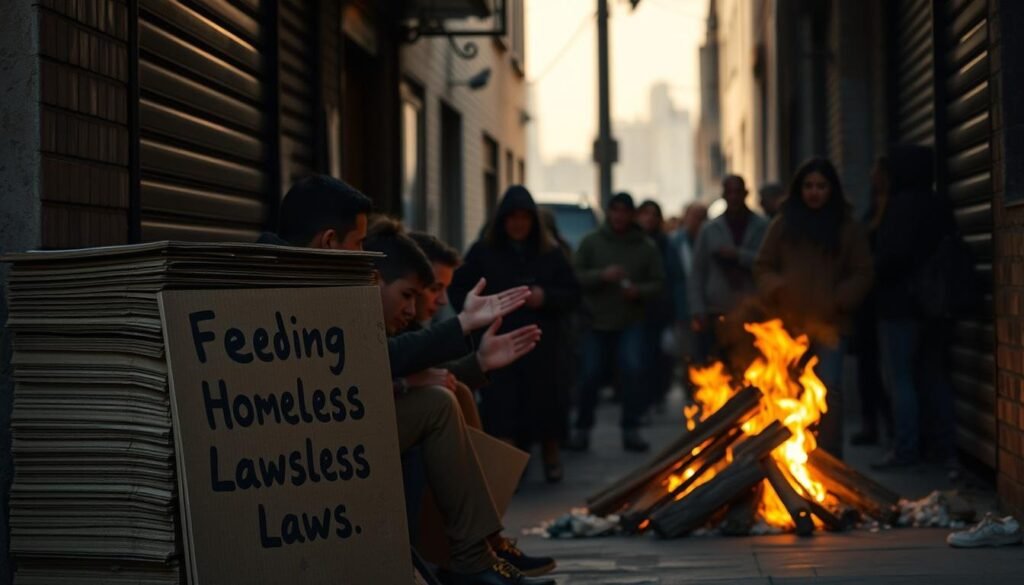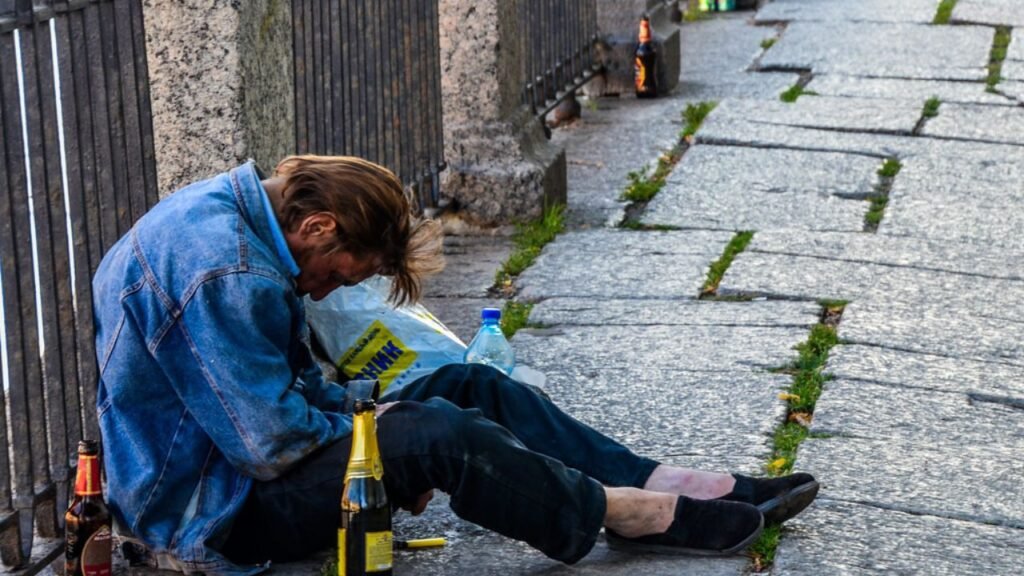The Legality of Feeding the Homeless: Feeding the homeless is a complex issue in the United States. It has sparked debate across the country. If you’re thinking about helping, you might wonder about the legal side.
In some places, feeding the homeless is not allowed. It’s important to know about feeding homeless laws to avoid trouble. Learning about these laws helps you help others while following the rules.
This topic is about the legal side and the social aspects of feeding the homeless. It aims to help you understand this sensitive issue better.
Contents
- 1 The Evolution of Anti-Homeless Legislation
- 2 Is It a Crime to Feed the Homeless? Understanding Local Ordinances
- 3 Regional Variations in Anti-Feeding Laws
- 4 Legal Challenges and Constitutional Questions
- 5 The Human Impact of Feeding Restrictions
- 6 How to Legally Support Homeless Individuals
- 7 Conclusion: The Legality of Feeding the Homeless
- 8 FAQ
- 8.1 What are the laws regarding feeding the homeless in the United States?
- 8.2 Can I be arrested for feeding the homeless?
- 8.3 Are there any cities that have banned feeding the homeless outright?
- 8.4 What are some alternatives to directly feeding the homeless?
- 8.5 How can I stay informed about the laws and regulations regarding feeding the homeless in my area?
- 8.6 Can I challenge anti-feeding laws in court?
The Evolution of Anti-Homeless Legislation
To understand anti-homeless laws, we must look at their historical context. We see how society’s views and economic times have shaped these laws. This helps us grasp the impact on homeless people.
Early Legislation and Its Impact
At first, laws against homelessness were restrictive and punitive. They banned loitering, begging, and public sleeping. This made being homeless a crime.
These laws hurt homeless people a lot. They made them feel more left out and attacked. Looking into these laws’ history shows us the complex reasons behind them.
Today, laws against homelessness keep changing. This is because of things like gentrification and city growth. As cities evolve, so do the laws about homelessness. These changes reflect how society views homelessness now.
Is It a Crime to Feed the Homeless? Understanding Local Ordinances
Feeding the homeless can be a complex issue. Different places have their own rules about it. Some cities have laws that say where and when you can feed the homeless. It’s important to know these rules if you want to help.
Local laws about feeding the homeless vary a lot. Some places don’t let you feed people in certain areas. For example, Orlando and Tampa in Florida have rules about where you can feed the homeless.
- Las Vegas, Nevada: Requires permits to feed the homeless in some spots.
- Fort Lauderdale, Florida: Has rules against feeding in public, with fines if you don’t follow them.
- Phoenix, Arizona: Has specific rules for feeding the homeless in public places.
These cities show how different places handle feeding the homeless. Knowing the laws in your area can help you avoid trouble. Rules about feeding can affect both those giving food and those getting it.
It’s key to understand the rules about feeding the homeless. This knowledge helps you make a difference while staying legal.
Regional Variations in Anti-Feeding Laws
Laws about feeding homeless people vary a lot across the United States. What’s okay in one place might be illegal in another.
Different areas have their own rules because of local laws. For example, some cities don’t let you feed people in certain spots. Others need permits for big food giveaways.
Impact of Regional Laws on Homeless Populations
These laws really affect homeless people. In places where feeding is banned, it’s harder for them to get food. This makes their health problems worse and makes them feel even more left out.
- In some places, people are scared to give out food because of the law.
- Others find legal ways to help, like setting up safe feeding spots.
- Places that are more open to feeding homeless people often see more community help.
When you think about helping the homeless, knowing the local laws is key. This way, you can really help in your area.
Legal Challenges and Constitutional Questions
Communities face legal hurdles when dealing with homelessness. Laws against feeding the homeless are often questioned. These laws touch on the First Amendment rights of those who want to help.
The First Amendment protects free speech and assembly. Yet, laws against feeding the homeless limit where and when food can be given. Courts must decide if these laws go too far.
Court Cases Challenging Anti-Feeding Laws
Many court cases have questioned the legality of these laws. For example, Bayside Historical Commission v. City of Fort Worth looked at a city’s ban on feeding the homeless. The court had to decide if this ban was against the First Amendment.
In People’s Park v. County of Santa Cruz, the court looked at a county law that limits food distribution in parks. They had to decide if this law was too strict.
| Case | Issue | Ruling |
|---|---|---|
| Bayside Historical Commission v. City of Fort Worth | First Amendment challenge to city’s ban on feeding homeless | The court ruled that the city’s ban was unconstitutional. |
| People’s Park v. County of Santa Cruz | Constitutionality of county ordinance restricting food distribution | The court found the ordinance to be overly restrictive. |
These cases show the ongoing legal fights over feeding the homeless. It’s crucial to think about the constitutional issues these laws raise. They affect both the homeless and those who want to help them.
Looking at these legal challenges and court decisions helps us understand the complex debate. It shows the importance of considering the rights involved.
The Human Impact of Feeding Restrictions
Laws that limit food distribution have a big effect on those in need. These restrictions don’t just cut off food; they deeply affect the lives of homeless people.
Not being able to get regular meals can cause malnutrition and health problems. In cities with strict laws, volunteers who help feed the homeless often face legal trouble. This leaves those in need without the support they need.
Personal Stories and Case Studies
Think about a homeless man in a city with strict feeding laws. Without regular meals, he got very malnourished and had to stay in the hospital for a long time. Stories like his show the human cost of such laws.
Studies show that these laws make life harder for homeless people. By not letting them get food, these laws can make hunger worse and cause health issues. It’s important to see how these laws affect people to find better solutions.
When thinking about feeding restrictions, we need a balanced solution. One that works for cities and makes sure homeless people get the help they need.
How to Legally Support Homeless Individuals
You can really help homeless people by using legal ways to assist them. It’s important to know how to help effectively in your community.
Volunteering at shelters or organizations is a great way to help. These places need volunteers for tasks like serving meals and counseling. Your help meets their immediate needs and supports these organizations.

Advocacy is a strong way to bring about change. You can help by pushing for laws that help solve homelessness. This includes affordable housing, mental health services, and job training. By getting involved in local events and campaigns, you can make a difference.
Getting the community involved is also key. Events like food drives, clothing donations, and fundraisers help right away. They also build a caring community for everyone.
Donating to organizations that help homeless people is another way to help. Every bit counts, whether it’s through volunteering, advocating, or giving money. Together, we can tackle homelessness.
Looking for legal ways to support homeless individuals ensures your efforts are effective and follow the law. This way, you can make a real difference and help create a lasting solution.
See Also: Is It A Crime To Threaten The President? Learn the Facts
Conclusion: The Legality of Feeding the Homeless
You now know more about the laws around feeding the homeless. These laws change a lot from place to place. It’s very important to know what’s allowed in your area.
Is it illegal to feed the homeless? It depends on where you are. Some cities have rules against it, while others allow it with some rules. Knowing these laws helps you avoid trouble and help those in need.
If you want to help by feeding the homeless, knowing the laws is crucial. Being informed lets you make a difference while staying legal.
FAQ
What are the laws regarding feeding the homeless in the United States?
Laws about feeding the homeless differ by city and state. Some places have rules that let you feed the homeless in certain spots. Others have rules that don’t.
Can I be arrested for feeding the homeless?
Yes, in some cities, you could get arrested or fined for feeding the homeless. This happens if you don’t follow local rules or get the right permits.
Are there any cities that have banned feeding the homeless outright?
Yes, places like Orlando, Florida, have laws that make it hard to feed the homeless. These laws might ban it in some areas or under certain conditions.
What are some alternatives to directly feeding the homeless?
Instead of feeding them directly, you can donate to groups that help the homeless. You can also volunteer at shelters or work to change policies that help the homeless.
How can I stay informed about the laws and regulations regarding feeding the homeless in my area?
To stay updated, check your local government’s website. You can also reach out to local groups or follow news about these laws.
Can I challenge anti-feeding laws in court?
Yes, people and groups have taken these laws to court. They often argue that these laws violate their rights to free speech or assembly.




